I . Survey
(i) Geographic Location
Shandong Province, Lu for short, is the old site of Qi and Lu realms. It is located in east coast of China and separated from countries like Japan and ROK by sea. Its continental coastline is 3,024 km. Shandong Peninsula extends into the sea and divides Bo Hai and Huang Hai, which endows it with advantageous location and brings more development opportunities from convenience in transportation by land and water. Total land area of the province is about 157,100 sq.km and forest coverage 24%. The province is studded with enclosed lakes like Weishan Lake and rivers like Yellow River, mother river of Chinese nation, which supplies annual water resource with gross amount of approximately 30.8 billion m3. There are also mountains like Mount Tai and Meng Shan standing in the province, providing outstanding spectacle. People combine the prominence of Mount Tai, Yellow River and Confucius, ancestor of Confucianism, to the saying of?? One Mountain, One River, One Saint?? to praise the prosperousness of culture and scene of Shandong Province.
Shandong has 17 cities: Jinan, Qingdao, Zibo, Zaozhuang, Dongying, Yantai, Weifang, Jining, Tai??an, Weihai, Rizhao, Laiwu, Dezhou, Linyi, Liaocheng, Binzhou and Heze, with altogether 140 counties and county-level cities/districts under its administration. Jinan is the provincial capital city called?? Spring City?? for its rich springs. Qingdao, located at the coast of Huang Hai, is the largest city of the province.
(ii) Climate Features
Shandong is in the warm temperate and sub-humid monsoon climatic region, so it has clear four seasons and comfortable climate with annual mean temperature about 14 ?栬 average annual precipitation 550-950 mm, and frost-free period over 180 days in coastal area and over 220 days in inner land area.
(iii) Population and Nationality
In the year 2005, total permanent population in Shandong Province is 92.4818 million. Population of Han-nationality is 91.7947 million which takes 99.26% of the total population; population of minorities such as Hui and Man is 687,100 which is 0.74% of the total population. Population density of the province is 589 persons/ sq.km.
(iv) Infrastructure and Traffic
Airport and Aviation
Shandong now has 7 airliner and air freighter airports and more than 300 airlines including 21 departure airlines to Japan, ROK, France, Germany, America, Russia as well as Hong Kong and Macao. The four airports in Jinan, Qingdao, Yantai and Weihai are international air harbors.
Harbor
Shandong has 24 harbors with annual cargo handling capacity of over 380 million tons. Ocean routes lead to over 140 countries and regions. Qingdao Port is one of the five largest harbors in Chinese mainland. It is ranked at 3rd place with annual cargo handling capacity of over 180 million tons and container shipping as much as 6 million standard containers. In the following five years, Shandong will increase 26 sea port berths and increase cargo handling capacity of 70 million tons.
Highway
All 17 cities of the province are connected through high standard highways. Mileage in highway open to traffic reaches over 80,000 km including expressway of 3,163 km. Mileage open to traffic and pavement quality all come out at the top level of the country. The highway transports passengers over 900 million every year. In the following five years, Shandong will increase expressway of 555 km.
Railway
Shandong is located at the center of the south-north traffic of east China with Beijing-Shanghai railway and Beijing- Kowloon railway going through it from north to south and Qingdao-Jinan railway going through it from east to west. Total length of railway is over 3,400 km and it transports passengers of 40 million people every year. Jinan Railway Station is important railway junction of the country. In the following five years, Shandong will increase electrified railway of 730 km.
Finance and Insurance
Shandong has altogether 34 banking institutions, 9 of which are foreign banks and representative office of foreign banks. 24 national insurance company set up branches in Shandong, and there are 146 specialized insurance intermediary organs of all classes.
Communication
By the end of 2005, fixed telephone subscribers in Shandong reached 28 million with diffusion rate of 30.5%; mobile telephone subscribers reached 23.41 million with diffusion rate of 25.5%. Fixed telephone network and mobile telephone network seamlessly cover all cities, counties, towns and villages.
Internet
Now Shandong has internet users of about 8 million. All cities and counties can have access to internet through telephone, private line or broadband.
(v) Foreign Affairs
Provinces, States and Cities of Friendship
Shandong has established good relationship with more than 130 foreign provinces, states and cities.
List of Provinces/States(regions, provinces and counties) of Friendship of Shandong Province
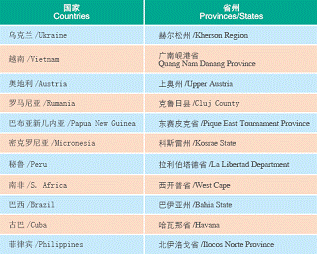
Foreign-related Fairs
Based on its own industry characteristics, Shandong has staged many kinds of foreignrelated fairs with local features which turned out good effect in extending communication and promoting trade.
List of Major Fairs of Shandong

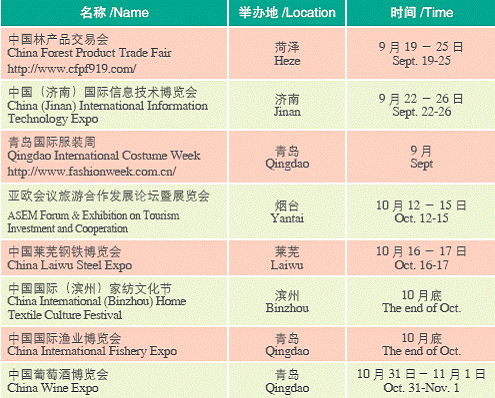
Major Festivals
Shandong is a rich land full of outstanding people, and it particularly shows the local culture and natural scene through various festivals.
List of Major Festivals of Shandong
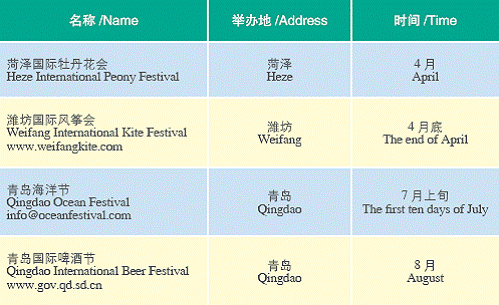

(vi) Higher Education and Scientifi c Research
Higher Education
Shandong is an important cradle of Chinese culture. Education concept of Confucius, originator of Confucian culture, cultivates the good personality of Shandong people to respect teachers and attach importance to education. Various education institutions are set up successively and education popularity degree is increased year by year which benefits all the people in the province. Now Shandong Province has 104 colleges and universities, such as Shandong University, Ocean University of China, China University of Petroleum, with students of 1.17 million; 806 medium vocational schools with students of 1.09 million; 4,404 middle schools with students of 5.92 million; 252 technician training schools with students of 320 thousand.
Scientifi c Research
Shandong has 330 various scientific research institutions and the research in agricultural technique and marine science, etc. is at the top level of the country. There are 32 academicians from National Academy of Science & China Engineering Academy, as well as 70,000 specialized technical personnel. In 2005, Shandong made more than 3,000 important scientific and technical achievements, 500 of which reached international leading level, and 495 of which won Provincial Science and Technology Award. Patent application amount in this year was as much as over 25,000 pieces.
(vii) Tourism
General Situation
Shandong is rich in cultural relics, historical sites and famous scenic spots: world natural and cultural heritage??Mount Tai Scenic Spot, world cultural heritage?? Qufu Scenic Spots of Temple, Mansion and Cemetery of Confucius, International Beer City??Qingdao and Taoism sanctum??Lao Shan, Fairyland of the World??Penglai, International Kite City??Weifang, Spring City??Jinan, etc. are particularly popular. Shandong has perfect facilities of traveling including 460 star hotels for tourism and various tourist services. In 2005, it received domestic and oversea tourists as much as 140 million person-times and realized tourist income of 100 billion Yuan; it received tourists from abroad of 1.55 million persontimes and realized tourist income from abroad of 780 million dollars.
Coastal City??Qingdao
Located at the south end of Shandong Peninsula and the coast of Huang Hai, Qingdao is a unique coastal city with charming sight and comfortable climate. Coastline of the city (including coastline of affiliated islands) is 870 km in which the continental line is 730 km which is 1/4 of continental line of Shandong. The coast detours with alternation of bay of cusp.
Qingdao is the sailing game site in 2008 Olympics. The charming and romantic beachscape, Taoism immortal hill on the sea??Lao Shan, flowery city scene??red tiles, green trees, blue sea and sky, buildings with typical European styles, modern facilities for entertainment, holiday, commerce and fairs??all these endow Qingdao, a city with combination of oriental and occidental style and harmony of hill, sea and city, with most beautiful beachscape and make it major port to receive oversea tourists. Qingdao International Beer Festival has been held successfully for 16 times. Each year it attracted millions of tourists and became the carnival of citizens and tourists. In 2005, Qingdao received tourists from abroad of 680,000 person-times, domestic tourists of 25 million person-times, and realized tourism income of 25.7 billion Yuan. Famous scenic sites in Qingdao includes: Lao Shan, Beach sightseeing, Navy Museum, Underwater World, Polar Ocean World, Badaguan Scenic Spot, etc.
Mount Tai Scenic Spot
Mount Tai was called Daizong in ancient times. The ancient emperors offered sacrifice here in worship of the heaven, so it contains rich Chinese traditional culture. The area here is 426 sq.km and altitude of the mountain is 1,545 m. Mount Tai is great and splendorous. With long history and rich cultural relics, the mountain has been esteemed prior to the other four famous mountains in China from ancient times. In 1982, Mount Tai was listed into the first group of National Famous Scenic Sites by the State Council; in 1987, it was listed into World Natural and Cultural Concurrent Heritage by UNESCO; in 1992, it was ranked in the top 40 resorts of China. Mount Tai now has 22 antique building groups under good protection with gross building area 140,000 m2, including 12 stone archways, 6 stone bridges, 7 stone pavilions, 1 copper pavilion and 1 iron pavilion. Because Mount Tai has more than 2,200 stone carvings, it is praised as?? China Cliff Carving Museum??.
Qufu ??Sankong?? Scenic Spots
?? San kong ?? refers to Mansion,Cemetery,and Temple of Confucius. They were the living place of Confucius, founder of Confucianism, and his family. These buildings are grand and magnificent. It is the third largest ancient building group that attracts domestic and oversea Chinese to come to visit it. Mansion of Confucius occupies land 240 mu, including halls, storied building and houses, altogether 463 rooms. In 1961, it was listed into the first group of Historical and Cultural Relics under State protection; in 1994, it was listed into World Cultural Heritage together with Temple and Cemetery of Confucius. Temple of Confucius is root temple to sacrifice Confucius. Built in 478 B.C., it is the model for other more than 2,000 Confucius temples in China, Korea, Japan, Vietnam, Indonesia, Singapore, and America, the temple with longest service time in China as well as one of the most famous existing ancient building groups. It has more than 100 buildings with over 460 rooms. Area of this ancient building is about 6,000 m2. Cemetery of Confucius is the cemetery of Confucius and his descendants, including over 100,000 tombs. It is a family cemetery with longest history and largest scale in the world. In the cemetery there are thickly dotted stones. There are more than 4,000 tombstones and inscriptions, as well as over 300 archways etc. Except the famous Han inscriptions having been transferred into Temple of Confucius, there are still inscriptions written by celebrities like Li Gefei, Wu Kuan, Huang Yangzheng, Yan Song, Kong Shangren, Gui Fu, Weng Fanggang, He Shaoji, Ruan Yuan, Shi Runzhang, Kang Youwei and lineal descendants of Confucius.
II . Economy
(i) Economic Aggregate
Economic aggregate of Shandong ranks 2nd place in our country. In 2005, Shandong realized GDP 1.8 trillion Yuan??15% higher than the previous year. The growth rate has kept two-digit number for 15 continual years. Per capital GDP reached 19,500 Yuan, i.e. about 2,400 dollars by the current rate. Respective proportion of the primary, secondary and tertiary industies is 10.6%, 57.4% and 32.0%.
(ii) Resources and Industry and Agriculture
Mineral Resources
Shandong has discovered 150 kinds of mineral resources, 58 kinds of which have reserves ranking in the top 10 of the country. Resources ranking at the fi rst place include gold, sulphurite, gypsum, quartz sandstone used for glass and facing granite; those at the second place include diamond and magnesite; those at the third place include petroleum, graphite, salt, geotherm, limestone, etc. Shengli Oilfield is the second largest petroleum production basis; extraction of oil in the province accounts for 1/3 that of China. Coalbearing strata area is 50,000sq.km and annual raw coal production is 132 million tons.
Marine Resources
Three sides of Shandong peninsula is closed by sea; therefore it has rich marine resources. Total coastline is over 3,100 km??about 1/6 of the continental coastline of China; coastal tidal flat area is over 3,000 sq.km, and sea area of sea approach is 170,000 sq.km. Fishery resources in sea approach are mainly fishes, shrimps, crabs, cephalopoda, shellfish, echinoderm, etc.
Agriculture
Shandong is an important agricultural area of China. Output of major agricultural products like grains, cotton, oil, vegetables, fruits, meat and aquatic products comes out at the top of the country. In 2005, Shandong realized total agricultural output value 366 billion Yuan, which was at the fi rst place of the country. Agricultural product export was about 1/4 that of the country.
Farm Production
Crop area is more than 10 million hectare. Its major crops include wheat, corn, soybean, rice, cotton, peanut, vegetables fruits and etc.
Animal Husbandry
Livestock breeding stock of Shandong is at the fist place of the country. In 2005, Shandong realized gross animal husbandry output value 112.5 billion Yuan??10% higher than the previous year. Total meat output was 8.66 million tons, total poultry eggs output 4.68 million tons, and total milk output 2.76 million tons.
Aquatic Products Industry
Shandong is endowed with rich fi shery resources, and it has largest output of aquatic products of China. In 2005, major ocean industries realized output value 240 billion Yuan, 13% higher than the previous year. Total aquatic product output was 7.2 million tons.
Output of Major Agricultural Product in Shandong (unit: ton)

Industry
In 2005, Shandong realized gross industrial output value 3,538.743 billion Yuan, including
light industry output value 1,312.413 billion Yuan, accounting for 37.09%, and heavy industry output value 2,226.33 billion Yuan, accounting for 62.91%.
Manufacturing
Major manufacturing includes chemical industry, metallurgy, manufacture of building materials, machinery, shipbuilding, automobile, electronics, household appliances, textile, foods, etc. Chemical industry, manufacture of building materials, household appliances, textile, foods, etc have important status in China. Shandong has many world famous brand-products enterprises, such as Qingdao Haier, Hisense, Yantai Dongyue, Jinan Heavy-Duty Truck, Zibo Xinhua Pharmacy, Binzhou Weiqiao Textile, etc.
Mining Industry
Coal mining and dressing, petroleum and gas exploitation, ferrous metal mining and dressing, etc are relatively developed. Economic indicator of enterprises like Shengli Oilfield, Yanzhou Mining and Zhaojin Group come out at the top in the same industry of the country.
Output of Major Industrial Product in Shandong
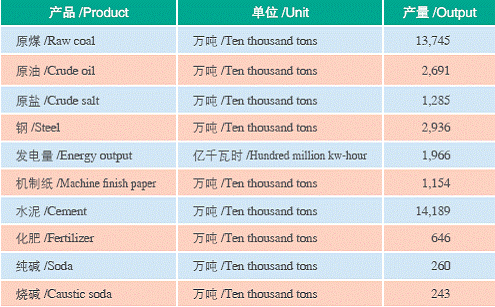
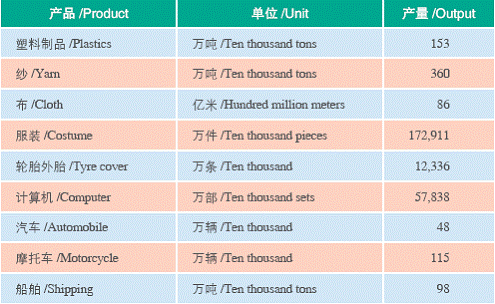
(iii) Business Data
Import & Export
In 2005, total export and import volume of Shandong was 76.9 billion dollars, 26.5% higher than the previous year, including export volume 46.3 billion dollars, increasing by 29%, and import volume 30.6 billion dollars, increasing by 22.8%.
Trade Partners
There are more than 200 countries and regions establishing trade relation with
Shandong Province.
Trade Structure
Export of textile costume, agricultural product and machinery and electrical appliances in 2005 was respectively 10.78 billion dollars, 6.9 billion dollars and 13.58 billion dollars, and the corresponding proportion in gross export of the province was 23%, 15% and 29%; respective import
of them was about 1.48 billion dollars, 4.87 billion dollars and 10.16 billion dollars, and the corresponding proportion in gross import of the province was 5%, 15% and 34%.
Export in general trade, processing trade and other trade was respectively about 23.1 billion dollars, 22.8 billion dollars and 540 million dollars, and the corresponding proportion in gross export was 50%, 49% and 1%; import of them was respectively about 12.59 billion dollars, 13.26 billion dollars and 4.14 billion dollars, and the corresponding proportion in gross import of the province was 42%, 44% and 14%.
Situation of Import and Export of Three Important Commodities of Shandong in 2005
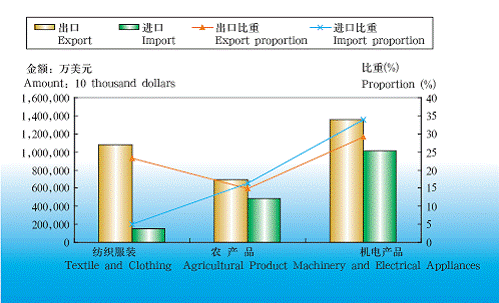
Mode of Import and Export of Shandong Province in 2005
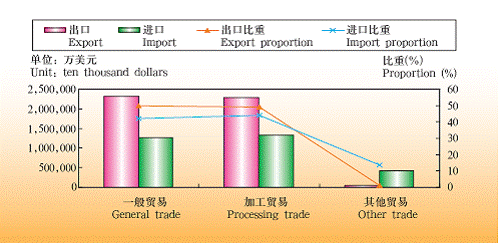
List of Major Imported Commodities in 2005 Amount unit: hundred million dollars
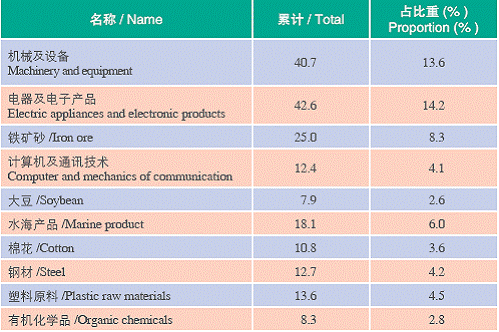
List of Major Exported Commodities in 2005 Amount unit: hundred million dollars

Introducing Foreign Investment
In 2005, Shandong practically used foreign investment 11 billion dollars. There are more than 130 countries.and regions investing in Shandong. The top six sources are Korea, Hongkong, America, Japan, Taiwan and the British Virgin Islands.
Foreign capital is mainly invested in agricultural and subsidiary foodstuff processing industry, communication facilities, computer and other electronic equipment manufacturing, textile costume, shoes and cap manufacturing, transport and communication facilities manufacturing, universal device manufacturing, nonmetallic minerals manufacturing, textile industry, chemical feedstock and chemicals manufacturing, electrical machinery and apparatus manufacturing, special equipment manufacturing, etc.
Situation Graph of Cumulative Major Countries and Regions Investing in Shandong

Distribution Graph of Foreign Direct Investment (FDI) of Different Industries
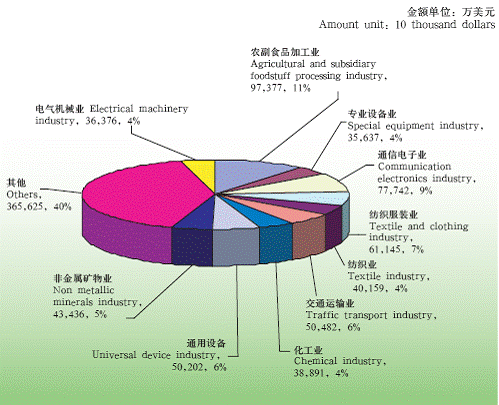
Partners
There have been 116 enterprises ranking in the top 500 strong enterprises of the world invested in Shandong, such as American General Motors, Agere, Hewlett Packard, Universal Container, Coca Cola??Pepsi-Cola, Mcdonalds, Kentucky tar sand; Japanese Mitsubishi, Mitsui, Itochu Corporation, Sumitomo Corporation, Panasonic, Marubeni Corporation, Sojitz Corporation, Hitachi, Suzuki; British/Dutch Shell Petroleum, Unilever; German Simens, Metro; French Carrefour, Total; Swiss
Nestle Coffee; Korean Daewoo, Samsung, Hyundai, SK, LG, etc.
Investment abroad
By the end of 2005, Shandong has approved 1,075 enterprises (organizations) to invest abroad. Total investment of Chinese and foreign parties through contract was 1.47 billion dollars, 1.07 billion dollars of which was invested by Chinese parties. The investment covered fields like household appliances, textile costume, mineral products, wood, machinery, food processing, light industry, information technology, planting, marine product processing, farm machinery, real estate, advertisement, tourism, diet, fishery, etc., and the investment was distributed in more than 100 countries and areas. Resource development, manufacturing and service trade has gradually become three major fields for investment abroad.
Contract foreign projects and cooperation of labor service
By the end of 2005 , Shandong had signed foreign project and labor service contracts with total value of 11.2 billion dollars and realized turnover 8.5 billion dollars involving industries like construction,transportation, petrochemical,electric power, fishery operation, machine-building and electronics industries, fishery harvesting, agricultural planting, textile costume, diet service, food processing and computer software. Relevant business spread over 100 countries and regions. The major markets include Japan, Korea, Singapore, Israel, Hongkong, South Asia, Africa, Middle East, West Asia, etc. Shandong Electric Power Construction Corp., Shengli Petroleum Administration Bureau, Qingdao Construction Group, China Railway Shisiju Group Corporation, Shandong International Corporation, Weihai International Corporation and Yantai International Corporation are major enterprises to contract foreign project and labor export service. By the end of 2005, Shandong had cumulatively export labor service 280,000 person-time, and the number of people sent out abroad by then reached 70,000.
Technology introduction
During 2001-2005, Shandong registered altogether 2,286 technology introduction contracts with value of 1.04 billion dollars, including 331 contracts on permitted transfer of patent and proprietary technology with contract value of 310 million dollars, 1,531 contracts on technical consultation service with contract value 530 million dollars, and 424 contracts on others with contract value of 200 million dollars. In 2005 Shandong registered 658 technology introduction contracts with value of 430 million dollars (technology cost of 260 million dollars and equipment cost of 170 million dollars).
Circulation of commodities
In 2005, Shandong realized total volume of retail sales of social consumer goods 510 billion Yuan,increased by 15% than the previous year; more than 300 commodity transaction markets realized business volume over one hundred million Yuan, including 10 approved retail enterprises invested by foreign businessmen. There are more than 3,000 enterprises engaged in materials circulation.
Large-scale domestic and oversea circulation enterprises like Denmark Maersk Group, Japan Itochu Corporation, Korea Hanjin, Singapore Singamas, and domestic China National Materials Storage & Transportation Corp. and Cosco have been set up in Shandong. Now there are 67 circulation gardens constructed or under construction.
III . Investment
(i)Policy and Administrative Rules
Catalogue of Related Laws
Foreign Trade Law of the People's Republic of China
Customs Law of the People's Republic of China
Law of the People's Republic of China on Import and Export Commodity Inspection
Law of the People's Republic of China on Chinese-Foreign Equity Joint Ventures
Law of the People's Republic of China on Chinese-Foreign Contractual Joint Ventures
Law of the People's Republic of China on Foreign-Capital Enterprises
Company Law of the People's Republic of China
Law of the People's Republic of China on the Entry and Exit Animal and Plant Quarantine
Law of the People's Republic of China on Control of the Entry and Exit of Aliens
Law of the People's Republic of China on the Control of the Exit and Entry of Citizens
Securities Law of the People's Republic of China
Income Tax Law of the People's Republic of China for Enterprises with Foreign Investment and Foreign Enterprises
Individual Income Tax Law of the People's Republic of China
Law of the People's Republic of China on the Administration of Tax Collection
Environmental Protection Law of the People's Republic of China
Law of the People's Republic of China on Evaluation of Environmental Effects
Law of the People's Republic of China on Promotion of Cleaner Production
Law of the People's Republic of China on Prevention and Control of Desertification
Marine Environment Protection Law of the People's Republic of China
Law of the People's Republic of China on the Prevention and Control of Atmospheric Pollution
Law of the People's Republic of China on Prevention and Control of Environmental Pollution by Solid Waste
Law of the People's Republic of China on Prevention and Control of Water Pollution
Law of the People's Republic of China on Prevention and Control of Environmental Noise Pollution
Law of the People's Republic of China on Prevention and Control of Radioactive Pollution
Frontier Health and Quarantine Law of the People's Republic of China
Labour Law of the People's Republic of China
Trade Union Law of the People's Republic of China
Searching Website for the Related Laws
1 . Searching System of Laws and Regulations of China (website of National People??s Congress of China)
http://law.npc.gov.cn:87/home/begin1.cbs
2. China Legislative Information Network System
http://www.chinalaw.gov.cn/jsp/jalor/index.jsp
3. Ministry of Commerce
http://www.mofcom.gov.cn
The above-mentioned websites are for reference only.
(ii)Key Investment Fields
Focusing on the development of transport and communication facilities, electronic information industry, home appliances, textile and clothing industry, chemical and medical industry, food and other industries, Shandong Province has well-formed chains in those fields. Foreign merchants are encouraged to invest in those industries to further their development.
1.Transport and communication facilities
Key transport and communication facilities include cars, trucks, special vehicles and ships with high added-value such as supertankers, container ships, oceaneering ships, long-range fishing and factory ships, high-speed luxurious yachts, etc.
2. Electronic information industry and home appliances
Key products of electronic information industry include computer and its matching parts, industrial automatic equipment and control system, high-performance digital-control SPC exchange, base station equipment, optical fiber communication and matching systematic equipment, mobile communication facilities, etc. Key home appliances include digital home appliances and housing products. It aims to regenerate traditional products and develop small appliances.
3. Textile and clothing industry
Textile and clothing industry focuses on the development of western-style suits, shirts, fashionable clothing, knitting underwear and coats, and sport clothes to improve design and production.
4. Chemical and medical industry
Chemical and medical industry attaches first importance to develop petrochemical products, frontier fine chemical products, rubber, drugs against tumor and cardiovascular disease, vitamin products made of halobios, generic engineering medicines and vegetable drugs.
5. Food industry
Food industry puts emphasis on the development of oceanic foods, grain products, farming and poultry products, juice beverage, beer and dry red wine to raise processing level and added value.
Shandong Peninsula Manufacturing Base
It is composed of 28 counties (or cities, districts) of Qingdao, Yantai, Weihai, etc. Its has an area of 30,000 km2 and an population of 16.09 million, accounting for 19% and 17% of that of Shandong province respectively.
Qingdao is the host city of the sailing events for the 2008 Olympic Games. In 2005, its GDP reached 250 billion Yuan. Nowadays, Qingdao is quickening its pace to develop home appliances, locomotives, shipbuilding industry, petrochemical industry and new material industry.
GDP of Yantai in 2005 reached 200 billion Yuan. Yantai makes great efforts to develop new promising industries and products such as automobiles, electric components, machines and computers.
GDP of Weihai in 2005 reached 120 billion Yuan. Weihai??s traditional industries such as machinery, chemical and building material industries and new high-tech industries such as electronic information, new material and bioengineering industries are all developing at a high speed.
There are three civil airports in Qingdao, Yantai and Weihai. All of them are international airports. The annual passenger throughput of Qingdao airport is 8.6 million man times, goods/parcels throughput 119,000 tons.
Qingdao, Yantai and Weihai have 18 ports totally, including 200,000-ton crude oil ports, 5,200,000-ton ore appropriate berths, bulk cargo ports and coal ports.
In the future five years, Qingdao, Yantai and other coastal cities are planning to establish 26 sea port berths, with an increase of goods throughput of 70 million tons.
Economy of Shandong Peninsula is developing at the fastest speed in Shandong province. It has 33,438 foreign-invested enterprises till now. Its actual used foreign capital reaches 38 billion dollars, accounting for 59.7% among the total amount of Shandong province; its value of foreign trade in 2005 was 49.2 billion dollars accounting for 64.3% among that of Shandong province; its number of world top 500 corporations which have invested in Shandong province accounts for 66% of that of Shandong province.
(iii) Living Environment
Urban living environment
Shandong province is characterized by its honest people, stable society, great public security, complete public facilities, complete facilities for business activities and leisure time entertainment. Its urbanization rate is 45%; urban population density is 921 persons/km2; area of afforestation is 121,477 hectares; per capita public green space is 13.93 km2; rate of tap water is 99.19%; annual sewage-disposal capacity is 1.173 billion m3. Weihai city is named as the best city to live in, and was awarded 2003 Annual Habitat Scroll of Honor by United Nations. Yantai was awarded the 2004 Annual Award for Living Environment in China. Qingdao is a famous tourism city as well as one of the top 10 cities with economic vitality in China.
International schools
In Shandong coastal cities such as Qingdao, Yantai and Weihai, special schools have been established to educate foreign children whose parents are working here, and local governments have worked out many favorable polices for their schooling.
For detailed information, please visit
Qingdao Education Information Website http://www.qdedu.net/
Yantai Education Information Website http://www.ytedu.edu.cn
Weihai Education Information Website http://www.whedu21.com/
Medical and hygienic services
Shandong province has 16,000 hygienic organizations, including 3,000 hospitals/ health centers, 177 hygiene and disease control organizations and 149 women and children health centers, with a total amount of ward beds of 230,000. Those organizations have 136,000 doctors and 96,000 nurses totally.
(iv) Reference Prices of Basic Elements
1. Electricity for non-industrial and normal industrial use: 0.7152 Yuan/kWh
2. Electricity for non-household lighting: 0.7972 Yuan/kWh
3. Electricity for large-scale industries: 0.6252 Yuan/kWh
4. Gas for industrial use: 1.2 Yuan/m3
5. Gas for business: 1.5 Yuan/m3
6. Water for hotels and restaurants: 3 Yuan/m3
7. Water for enterprises and institutions: 3 Yuan/m3
8 . Industrial land to lease ( near outskirts): 120-270 Yuan/m2
9. Industrial land to lease (far outskirts): 45-90Yuan/m2
10. Communication cost
(1) Fixed-line phone: phone calls within a business district: 0.22 Yuan for the first three minutes, 0.11 Yuan per minute from the fourth minute; phone calls between business districts: 0.4 Yuan per minutes; domestic long-distance calls: 0.07 Yuan/6 seconds; phone calls to Hong Kong, Macao and Taiwan: 0.20 Yuan/6 seconds; international calls: 0.80 Yuan/6 seconds.
(2) Mobile phone: monthly rental of GoTone: 50 Yuan/month; local calls: 0.4 Yuan/minute; international calls: 0.80 Yuan/6 seconds.
Average Wage and Index of Workers in Shandong Province in 2005 (Unit: Yuan)

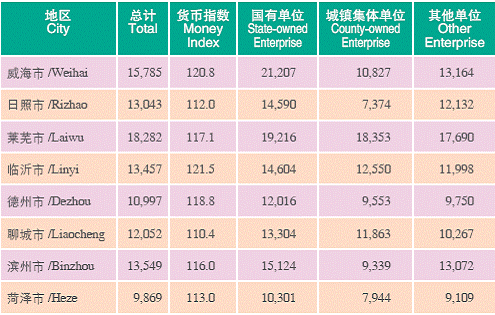
IV. Development Zones
(i) National Development Zones
There are three national economic and technical development zones, one bonded zone and five export processing zones in Shandong province.
Qingdao Economic and Technical Development Zone
It was established in 1984 with the approval of State Council. It attaches first importance to develop modern port, heavy and chemical industry, home appliances, biological pharmacy, international trade and tourism. www.qda.gov.cn
Yantai Economic and Technical Development Zone
It was established in 1984 with the approval of State Council. It lays emphasis on the development of machinery, automobile parts, electronic information, textile, biological pharmacy and other industries. www.yantaimarket.com/cn/city/yq/
Weihai Economic and Technical Development Zone
It was established in 1992 with the approval of State Council. It focuses on the development of electronic information, bioengineering, new energy, new material and other high-tech industries and urban infrastructural construction. www.e-weihai.gov.cn
Qingdao Bonded Zone
It was established in 1992 with the approval of the State Council. It attaches first importance to develop international trade, bonded storage, distribution and export processing industry. www.qdftz.com
Yantai Export Processing Zone
It was one the first fifteen export processing zones with the approval of State Council. It puts emphasis on developing bioengineering, electronic industry, medical industry, fine processing industry, engineering industry, new material, chemical fiber and textile industry, light industry and automobile industry. www.yantaiepz.gov.cn
Weihai Export Processing Zone
It was established in 2000 with the approval of State Council. It focuses on the development of electronic information, fine machine building, bioengineering, medical engineering, new material and food processing industry. www.whepz.com
Weifang Export Processing Zone
It was established in 2003. It focuses on the development of electromechanical integration, electronic information, fi ne machine building, fine processing, biological pharmacy and deep processing industry of agricultural and sideline products. www.weifangepz.com
Jinan Export Processing Zone
It was established in 2003. It focuses on the development of electromechanical integration, biological pharmacy, textile industry, light industry and furniture industry. www.jnepz.com.cn
(ii) Provincial Development Zones
There are seventy-one provincial economic development zones in Shandong province. With good investment environment and favorable polices, they are important zones for Shandong to carry out cooperation with foreign enterprises.
List of Shandong Provincial Economic Development Zones
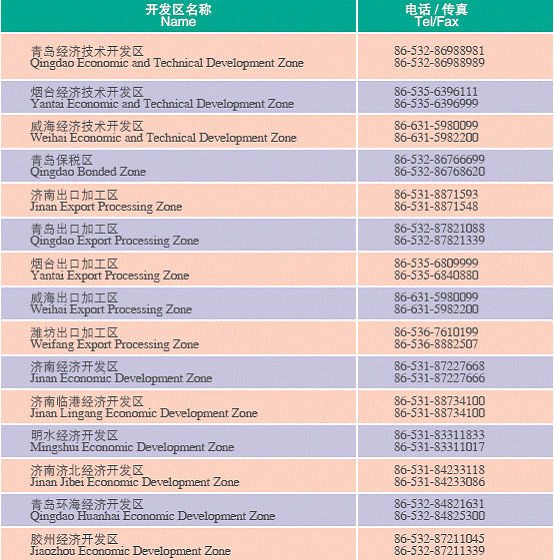
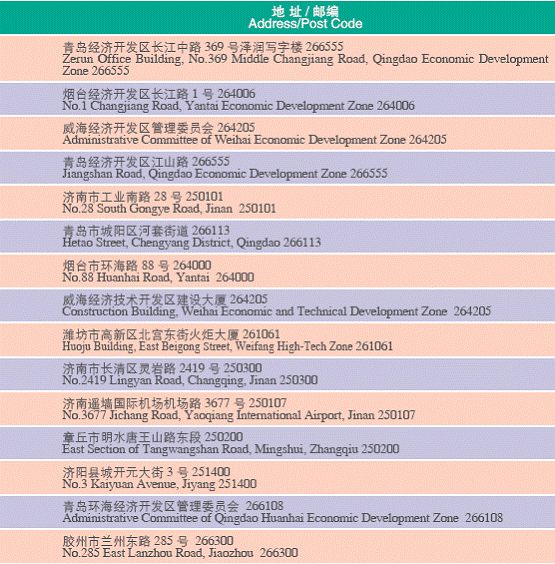

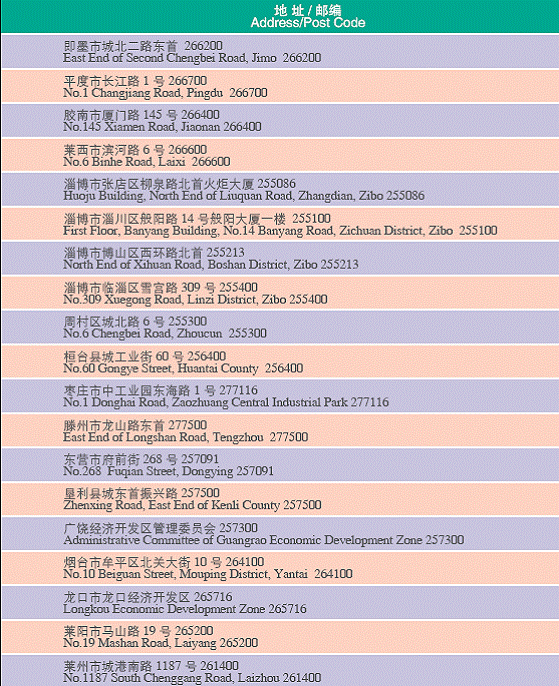

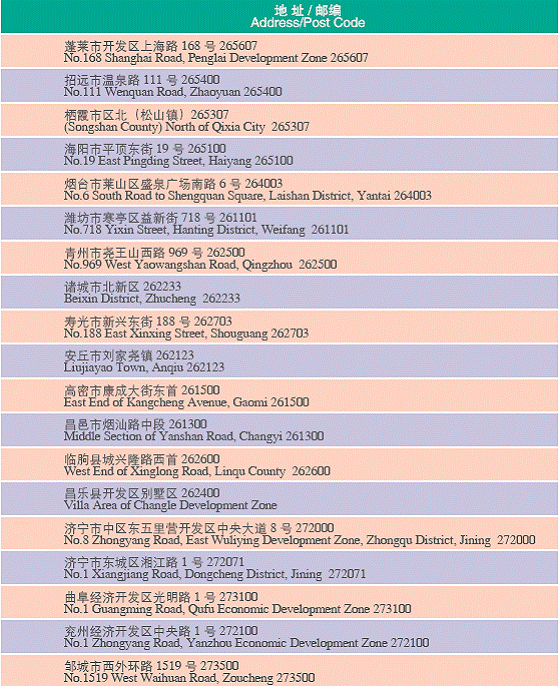
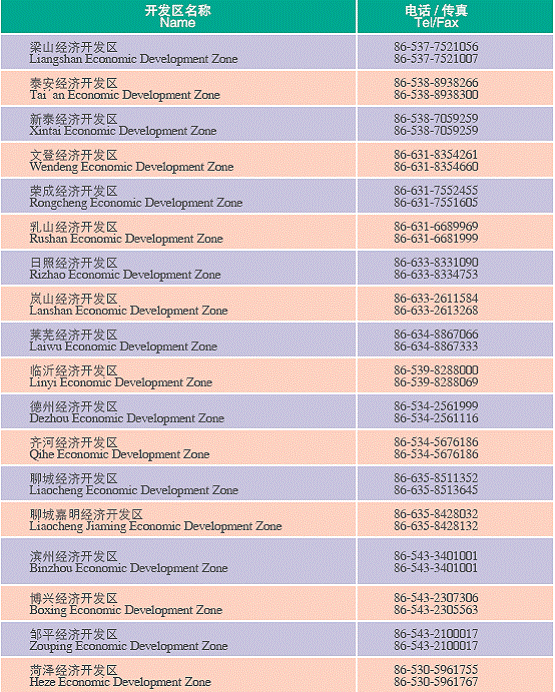
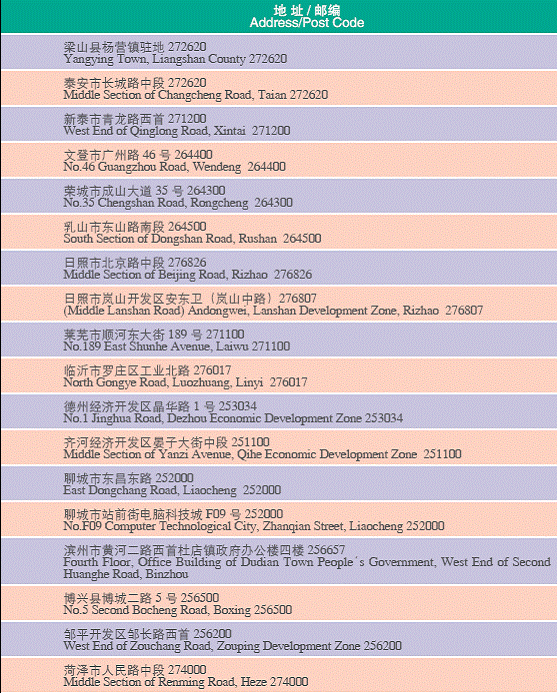
(iii) Relevant Organizations
List of Shandong Provincial Investment and Trade Promotion Authorities
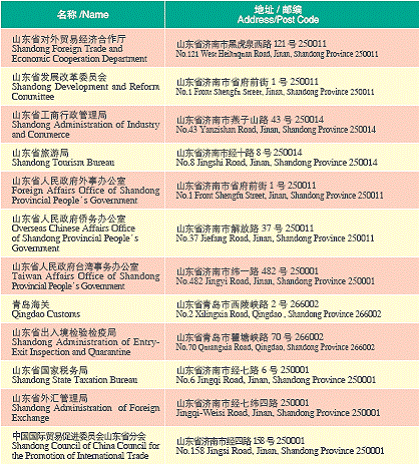
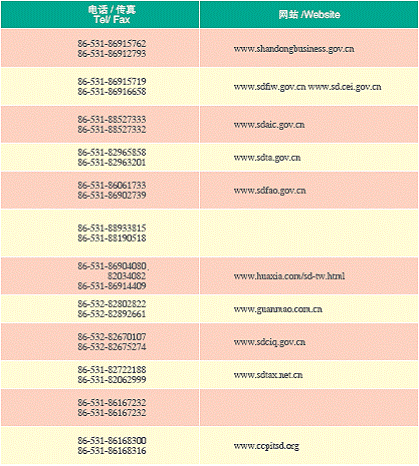
Appendix
1. Phone numbers of Shandong province
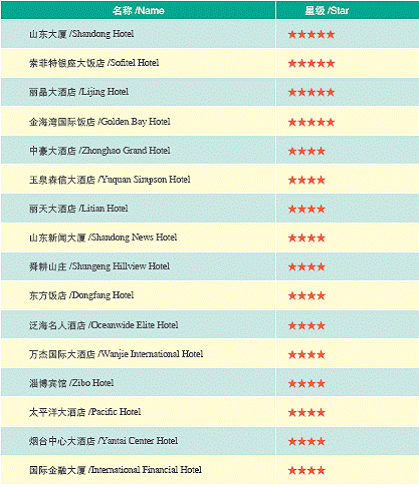
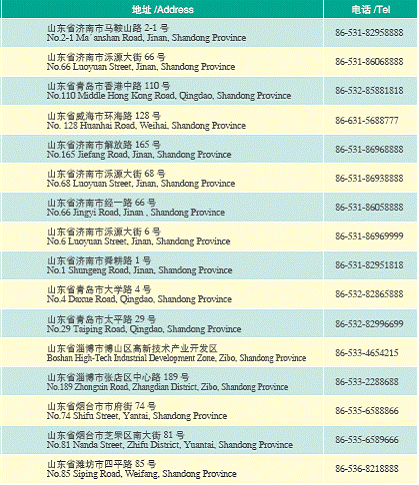
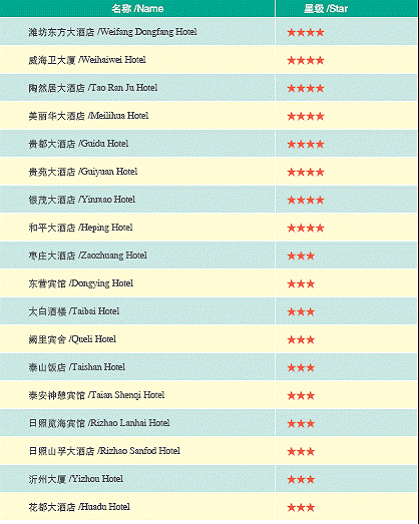
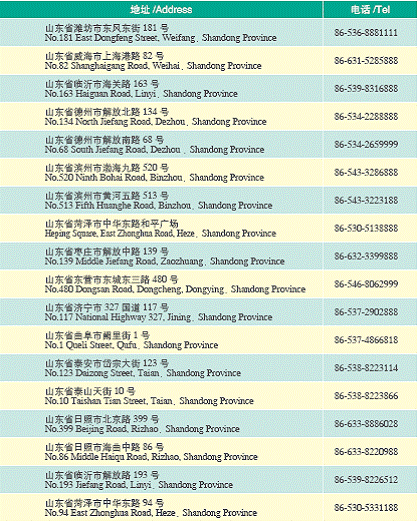
2. Phone numbers for services and emergencies
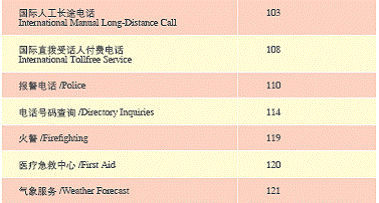
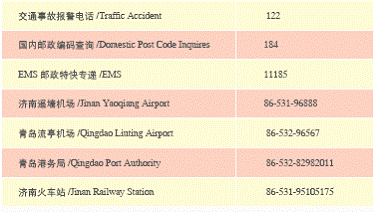
3. Working hours of relevant organizations
Working hours of governmental organizations: five working days and two offdays a week. Working hours of governmental organizations in Qingdao, Jinan, etc. are from 8: 30 to 17: 00; working hours of governmental organizations in other cities are from 8:00 to 12: 00 in the morning and from 14: 00 to 18: 00 in the afternoon.
Banking hours: 9: 00-17: 00, including weekends.
Shopping hours: 9: 30-22: 00, some stores for 24 hours.
(Ministry of Commerce)